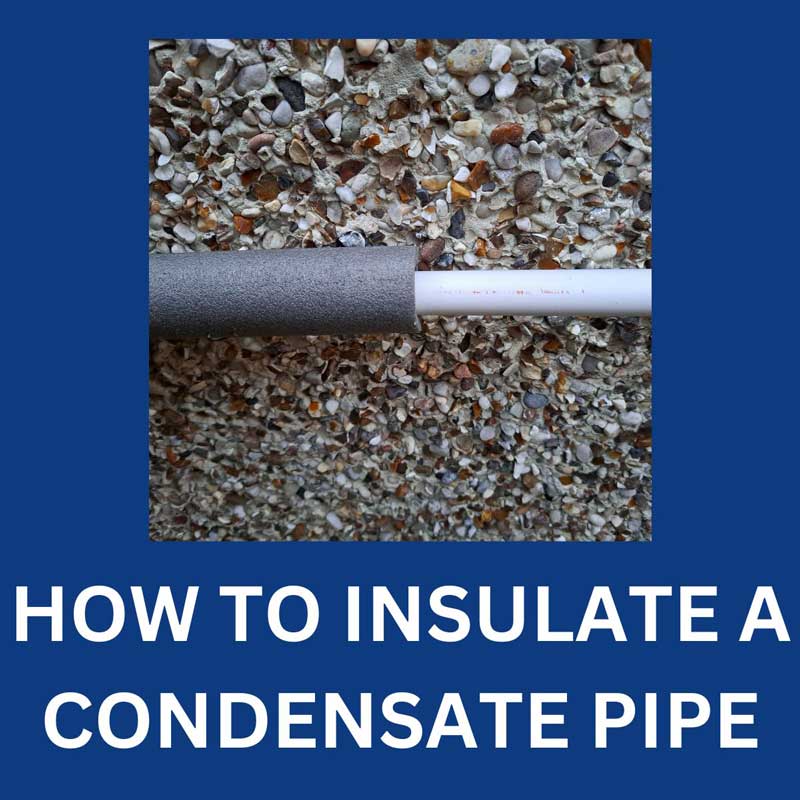
Condensate pipes play a vital role in our home heating systems, removing acidic waste water produced during heating.
Yet, many of us overlook the importance of condensate pipes until cold weather strikes and pipe freezing occurs, stopping your Boiler from working.
Insulating your condensate pipe will prevent freezing and ensure your heating remains on in the coldest weather.
The Basics Of Condensate Pipes
A condensate pipe carries the water, a byproduct from the combustion process in your heating system, away from the Boiler to a drain.
The pipe generally runs on an exterior wall, exposing it to the elements, especially in the frosty UK winters. An un-insulated pipe can freeze, causing blockages and even bursts, a potentially costly repair job.
Reasons to Insulate Condensate Pipes
- Freeze Protection: The UK is no stranger to cold snaps, and when temperatures plummet, un-insulated pipes can freeze, causing your heating system to shut down. Insulation acts as a thermal blanket, reducing the risk of freezing.
- Noise Reduction: If you’ve ever been irritated by the sound of water trickling downpipes, insulation can be your silent saviour, dampening those annoying noises.
- Longer Pipe Lifespan: Insulating pipes protect them from the elements, reducing wear and tear and adding years to their service life.
Choosing The Right Insulation Material
When deciding on the best insulation material, consider the location of the pipe, your budget, and desired results.
Foam Insulation Tubes
These are popular due to their easy installation. They act like a jacket, slipping over your pipes. They’re affordable and efficient, ideal for most UK homes.
Fiberglass Wraps
It is effective but can be fiddly to install. These wraps are wound around the pipe and offer excellent acoustic insulation.
Rubber Insulation
Durable and slightly more robust than foam, rubber insulation is excellent for pipes at risk of damage.
Tools And Materials Required
Before insulating, ensure you have the correct tools on hand:
- Chosen insulation material (foam, fiberglass, or rubber)
- Knife or scissors
- Tape measure
- PVC or aluminium tape or zip ties
- Gloves and safety goggles (especially if using fibreglass)
Step-by-Step Procedure to Insulate a Condensate Pipe
1. Safety First: Remember, Safety is paramount. Switch off your Boiler.
2. Measure: With your tape measure in hand, gauge the length of the pipe you wish to insulate. It’s always a good idea to get a bit extra, just in case.
3. Cutting the Insulation: Trim the insulation material to the required size using your knife or scissors.
4. Application: The method here varies based on material.
- For Foam Tubes: Gently pull apart the slit in the foam and place it around the pipe. It should nestle snugly.
- For Fiberglass Wraps: Begin at one end, winding the wrap around the pipe. Ensure overlaps to keep everything cosy.
- For Rubber Insulation: Similar to foam, ensure there are no gaps.
5. Sealing the Ends: Ensure you’ve got full coverage, using your tape to seal any joints or ends, locking warmth in and moisture out.
6. Check for Gaps: Look over your handiwork. Are there any exposed parts? If so, cover them up.
7. Secure the Insulation: Use tape or zip ties to keep everything in place, especially around bends or tricky areas.
8. Additional Tips
- Don’t compress the insulation too much; its effectiveness comes from the air trapped within.
- Trusted brands often provide clear instructions and may offer longer-lasting materials. It’s worth doing a spot of research or asking your local DIY store.
- If in doubt, there’s no harm in hiring a professional. A Gas Safe Registered engineer is sure to insulate your condensate pipe properly.
Maintenance And Care
Your pipes might be out of sight, but they shouldn’t be out of mind. Periodically inspect the insulation for wear or damage. Should you spot any troubled areas, patch them up or replace sections if needed.
Different materials have varying lifespans, but you’ll keep on top of any wear and tear with regular checks. The best time to check is in Autumn, so if necessary, you can reinsulate the pipe for winter.
Summary
In summary, insulating your condensate pipe is a proactive approach to home maintenance. Not only will it keep your Boiler running and save you from a cold home during a cold snap, but it can also reduce noise and save you money in the long run by preventing emergency callouts and extending the life of your pipe.
Following this guide will give your condensate pipe the protection it needs to serve your home efficiently for years to come. And when winter rolls around, you’ll have one less thing to worry about.
Need Help Insulating Your Condensate Pipe?
If you live in the Essex area and would like professional insulation of your condensate pipe, please Contact Us. We have a team of highly experienced Gas Safe Registered engineers who will do the job for you at a reasonable price.

Hi, I’m Terry, the founder and owner of TM Hughes & Son Gas Services
Please get in touch to book an appointment or receive a free, no-obligation quote
Call – 01245 830075
Email – info@tmhughesandson.uk
0% Finance
For Boiler Installations & Repair
